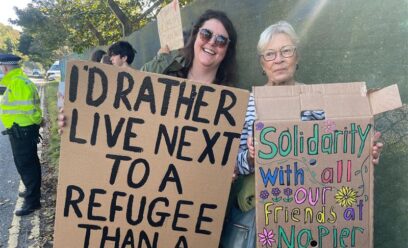LGBTQ+ History Month: journalist Zarith and doctor Issam discuss their experiences in the UK’s asylum system
Posted by IMIX on February 22, 2023Zarith is a journalist and International Migrants Day ambassador from Malaysia who sought safety in the UK. Issam Isa was a practicing doctor in Egypt, now living in the UK where he is in the asylum system despite being born here. For #LGBTQ+HistoryMonth, they talk about the impact of the asylum system on peoples’ mental health, the right to work and where LGBTQ+ people seeking safety can find support.
Zarith is a journalist who sought asylum in the UK after facing persecution in Malaysia because of his sexuality and because he blew the whistle on the government.
Issam is a practicing doctor who grew up eating beans on toast and watching Thomas the Tank Engine. Despite being born in London, he did not have British citizenship, as being born in the UK does not automatically entitle you to be a citizen. At least one of your parents must have been permanently settled in the UK, which neither of Issam’s parents were.
Now, he is stuck in the UK’s asylum system, waiting to work as a doctor again
Zarith: What challenges did you face when you arrived in the UK?
Issam: I was born and raised in London. I grew up eating beans on toast, watching Thomas the Tank Engine and Postman Pat, and playing with a Fisher Price phone. I left when I was in nursery school and lived in Tunisia, Libya, Switzerland. I also lived in Egypt, where I got my medical education. I always planned to come back to the UK, and I arrived here when the COVID-19 pandemic started. I’m currently living in Sheffield.
There are three exams you need to take to get a medical licence that will allow you to practice medicine in the UK. These cost a lot of money and it is not an easy journey. It was so challenging when I first arrived because everything was closed, everything stopped. Then there were the draconian visa laws, immigration laws, the endless boxes that you have to tick. It’s an endless labyrinth of paperwork you must submit.
I was the little guy caught between paying the costs for these exams and then paying visa costs to the Home Office. I was completely on my own.
Zarith: What do you think needs to change about the asylum system?
Issam: People are willing to work. If you’re working, you don’t spend all your time thinking about your stresses. Letting people work makes more sense than just making them sit in a hotel room, endlessly studying, like me. An apprenticeship where people are on the field rather than just them sitting in a hotel reading pages would be better. If you haven’t seen things on the field, you’ll never understand what you’re reading.
Organisations supporting refugees and people seeking asylum have to get people out of their homes. They should get them out to the library or to the gym and enable them to get a job. You have to enable people so they can start their lives.
Zarith: I know many professionals, engineers, dentists, nurses who speak good English in my courses and it’s hard to know that they aren’t allowed to work. They are not allowed to contribute or be themselves and most of them unfortunately, have to give up their careers for a job that is not in their field because their qualifications in their home country are not recognised here.
When people come to this country, their experience and skills should be recognised. They want to work, use their skills, and contribute. They should be allowed to do this.
Zarith: What impact does being on the asylum system have on mental health and how do you cope?
Issam: Whilst I was volunteering with Doncaster Conversation Club, we would check on people living in an isolated hotel in the middle of nowhere in Doncaster. That was really difficult. You are left alone in hotel room, and you’re not allowed to work, it’s very isolating. It feels like the system is designed to give you enough to survive, but not to start your life. They give you just enough food to eat, just enough money to survive, but make it hard for you to get a job.
I’ve seen some people who are really broken. You can tell that the system has crushed them. I’ve seen some people with some mental issues. They’ve arrived in the country, and they’ve been stuck for five or seven years. You really have to fight. If you give up the system will destroy you. Working would also help. If your body is tired from working, you don’t have time to think about your battles in the asylum system.
Zarith: February is LGBTQ+ History Month. Is there anything that you would like to highlight?
Issam: When I was in Libya and partly also in Egypt, we had this organisation where a group of us would get together to discuss books, philosophy, everything. We started re-examining queer culture in the Arab world. You can see from the history that there are a lot of poets and a lot of a lot of intellectuals who belong to queer culture. For example, Abu Nuwas who had multiple lovers and male partners, and Al Jahiz. I just tried to break the narrative out there that somehow this movement for LGBTQ+ rights is new.
Zarith: Are there any organisations supporting people LGBTQ+ people seeking asylum that you’d like to highlight?
Issam: There are so many good people out there who want to help. Where you land is really important. Things have been much better for me since living in Sheffield. There are so many amazing organisations here, such as City of Sanctuary Sheffield and Time to be Out. You have a lot of people here who are really working hard to help people seeking asylum. Thank you to Malcom Wern, David Sylph and William Roche from Time to be Out, Tom Martin, Alexi Diamond from City of Sanctuary Sheffield, and Dr. Julia Burne from Doncaster conversation club. They really enable people to start rebuilding their lives.
Zarith: The thing that makes the UK a home for me is that I am able to express myself as a gay person. Support for people seeing asylum is so important. I’d like to thank Rainbow Migration, Micro Rainbow, Refugees At Home and Student Action for Refugees. There’s also Galop, a befriender hotline for LGBTQ+ refugees or asylum seekers who need emotional support.



